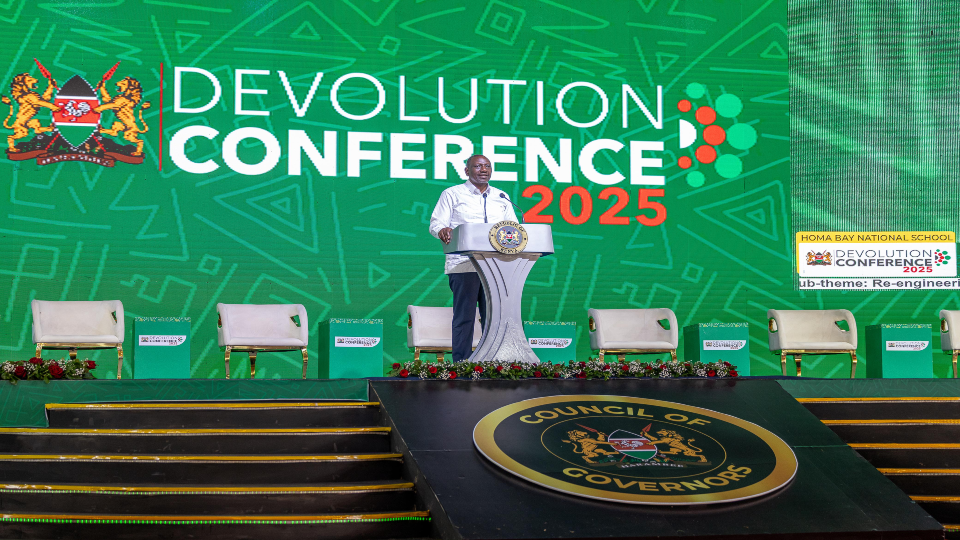President Ruto Criticizes Judiciary Over Anticipatory Bail in Corruption Cases
During the Biennial Devolution Conference in Homa Bay on Wednesday, August 13, 2025, President William Ruto called on the Judiciary to stop granting anticipatory bail to individuals accused of corruption, arguing that such orders obstruct arrests and prosecutions, thereby weakening efforts to combat graft. Ruto expressed frustration with what he described as weak legal precedents that shield corrupt individuals, specifically highlighting anticipatory bail as a loophole exploited by those accused of misappropriating public funds.
In his address, the President challenged the Judiciary not to serve as a refuge for corrupt individuals seeking protection through judicial decisions. He questioned the rationale behind anticipatory bail, stating, "A corrupt person goes to court and gets anticipatory bail. This makes it impossible for such a person to be arrested and prosecuted. How does that help fight corruption?" Ruto emphasized that this practice, which he claimed is unique to Kenya, allows those accused of stealing public resources to evade justice, hindering the country's progress in fighting corruption.
Ruto underscored that corruption undermines transformation efforts and stressed the importance of ensuring public resources are used as intended. He cited the expansion of the e-Citizen platform as a tool to enhance efficiency and reduce waste. Initially offering limited services in 2013, the platform has grown into a 24/7 one-stop shop, now providing over 22,000 government services worldwide. More than 14 million Kenyans are registered, with 500,000 accessing services daily, including passports, licenses, business registrations, land transactions, and certificates, all without intermediaries or bureaucratic delays. "No facility should charge citizens for a service that has already been paid for by the government. Without a doubt, technology can cut waste and boost efficiency," Ruto noted.
The President reiterated his commitment to holding corrupt leaders accountable, asserting that the Ethics and Anti-Corruption Commission (EACC) must fulfill its mandate without interference. "I have made it absolutely clear that there will be no sacred cows and no telephone calls from anywhere, below or above, to stop anybody from being prosecuted for corruption," he declared.
Ruto's remarks follow recent tensions between the executive and the Judiciary. Weeks earlier, the Judicial Service Commission (JSC) issued a statement condemning what it described as an escalating trend of public vilification and personal attacks against judges, particularly over bail and bond rulings. JSC secretary Winfridah Mokaya expressed grave concern over reactions to recent decisions by the Nanyuki and Kahawa Law Courts.
In Nanyuki, 111 individuals arrested during the July 7, 2025, Saba Saba protests in Laikipia County were charged with malicious damage to property and released on a Sh50,000 cash bail each. Some were reportedly detained on the eve of the demonstrations. In Kahawa, 37 youth faced terrorism-related charges stemming from protests on June 25 and July 7, 2025, and were released on a Sh50,000 cash bail or an alternative Sh200,000 bond each.
Critics, including former Chief Justice David Maraga, have questioned the use of terrorism charges against protesters, describing them as attempts to suppress dissent. On social media, some users demanded the release of personal details of magistrates, judges, and prosecutors involved in what they called trumped-up charges. Mokaya cautioned that such attacks threaten judicial independence and erode public trust in the justice system. She clarified that judicial decisions are guided by the Constitution, the Criminal Procedure Code, and the Judiciary’s bail and bond policy guidelines, emphasizing that officers do not act arbitrarily.
Mokaya urged dissatisfied parties to pursue appeals or reviews through legal channels rather than resorting to personal attacks. She also confirmed that the Judiciary Police Unit has implemented necessary security measures for judicial officers. "The commission reaffirms its unwavering commitment to defending the decisional independence of all judicial officers and judges," she stated.
The ongoing debate highlights the tension between anti-corruption efforts and judicial independence, as the government pushes for accountability while the Judiciary defends its role in upholding legal standards.


